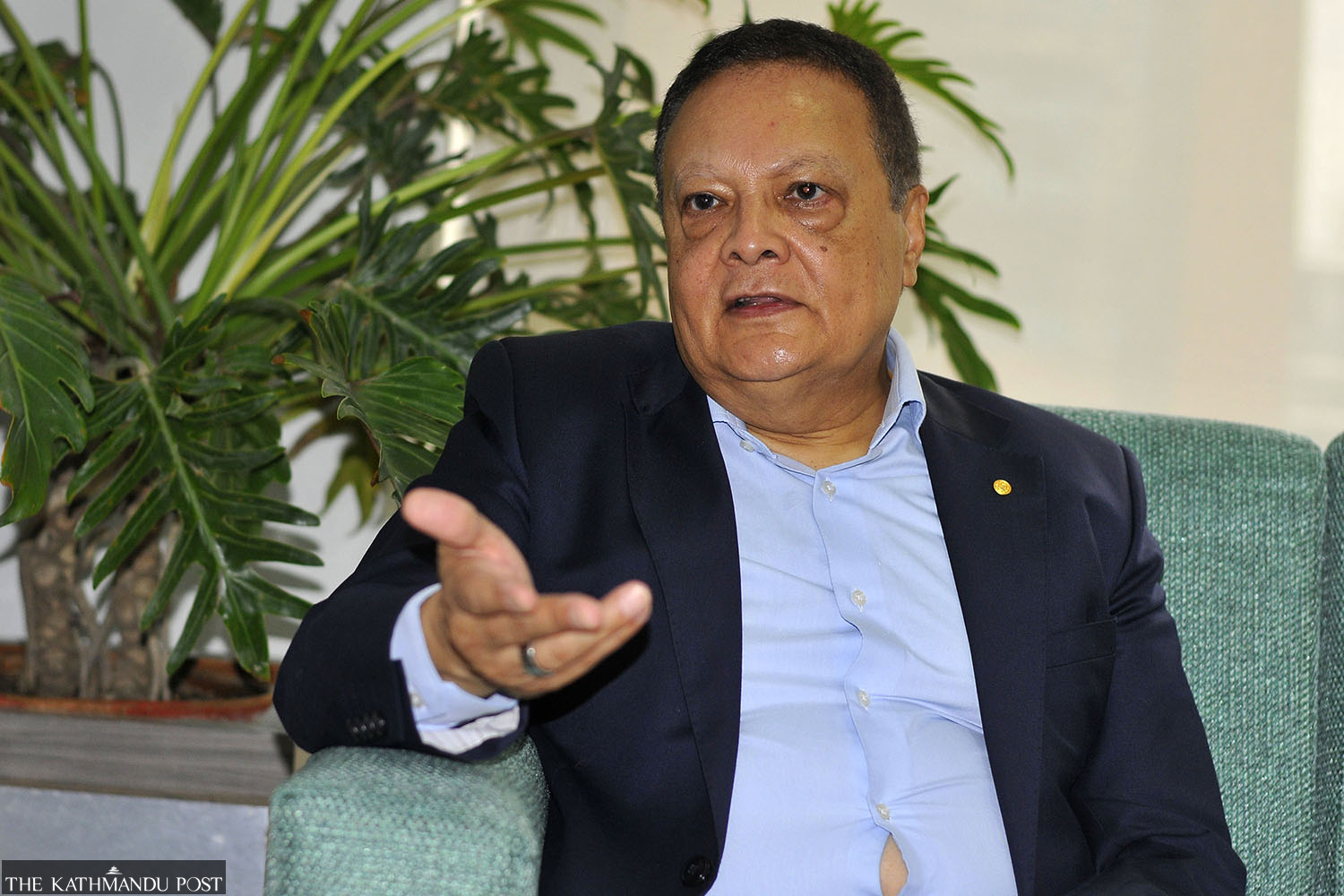Money
The real issue is governance, not who owns bank shares
Himalayan Bank CEO Ashoke SJB Rana says transparency, not segregation of businessmen and bankers, is key to reforming Nepal’s financial sector.
Post Report
Ashoke SJB Rana, CEO of Himalayan Bank Ltd, has decades of experience in the banking sector and is regarded as one of Nepal’s most seasoned bankers. Amid a growing debate on the proposed amendments to the Bank and Financial Institutions Act (BAFIA)—particularly regarding the separation of bankers and businesspersons—and rising concerns over non-performing loans, the Post sat down with Rana to gather his views. Below are excerpts from the conversation:
The Finance Committee of the federal parliament is currently discussing the BAFIA bill. As a veteran banker, how do you view the ongoing deliberations?
From the Nepal Bankers’ Association’s perspective—and based on my experience—the proposed amendments are more about updating the law to reflect the rise of digital transactions and address some emerging issues. However, in Parliament, we’re seeing external forces such as the Federation of Nepalese Chambers of Commerce and Industries (FNCCI) and the Confederation of Banks and Financial Institutions Nepal (CBFIN) getting involved and trying to influence the direction of the bill.
From our side, BAFIA is sound in its current form. It just needs some targeted amendments, not a complete overhaul.
One of the most contentious proposals is to bar individuals involved in industry or non-banking businesses from holding bank shares. What is your stance on this?
This debate seems unique to India and Nepal. If you refer to the current BAFIA provisions, anyone applying for a banking licence must pass a “fit and proper” test. All current promoters have undergone this process. The line between a banker and a businessman is, in fact, relatively thin. Even bankers are running a business—it just happens to be banking. The real issue lies in potential governance lapses when interrelated parties take loans from the same financial institutions they have invested in. This can be addressed through regulatory safeguards. For instance, those holding less than 1 percent equity in a bank should be barred from borrowing from that institution. They can go to other banks.
Larger shareholders' transactions should be transparently disclosed in annual reports. That’s how it’s handled globally. Nepal is also implementing the Nepal Financial Reporting Standards (NFRS), emphasising transparency. We should address the issue through disclosure and regulation rather than banning specific individuals from investing in banks.
Nepal’s economy has remained stagnant for a few years. How has this affected the banking sector?
The stagnation has significantly impacted banks. Non-performing assets (NPAs) have increased sharply, particularly in the small and medium enterprise (SME) segment. We’ve raised this issue with Nepal Rastra Bank (NRB). The NRB governor recently acknowledged that the government hasn’t identified key growth drivers to reignite the economy.

Following the 2015 earthquake and the Covid-19 pandemic, we experienced a short-lived growth of around 6 percent, driven by heavy government spending on reconstruction and relief. But since then, growth has plateaued. Industrial output is declining. The only consistent positive has been remittance inflows. The current economic model, heavily dependent on import tariffs, is unsustainable. Long-term structural reform is essential.
Banks did lend heavily post-Covid. Our private sector credit-to-GDP ratio has crossed 90 percent, which is unusually high for the region. In contrast, India’s is about 40 percent. These loans are still outstanding, but economic growth hasn’t kept pace. So now, banks are hesitant to lend more.
Moreover, with rising NPAs, many banks are under capital stress—even if they’re reluctant to admit it. Recently merged banks, like ours, have especially been feeling pressured. When capital is constrained, lending naturally slows. So, it’s not just a lack of lending opportunities—it’s about balance sheet stress.
The ruling coalition promised to revitalise the economy. Do you see any signs of market recovery?
Frankly, no. The current government’s economic performance has been underwhelming. Politically, they may claim success for staying in power, but the situation is bleak economically. The government lacks a clear direction. There’s no unified vision of where Nepal should be in five or six years. Ideologically, you have the UML, Nepali Congress, and other socialist elements pulling in different directions. Will the economy be led by the private sector or dominated by state-led development? No one knows.
At the moment, whoever can influence the government tends to receive favours. The development path is not just uncertain—it’s chaotic.
The cooperative sector is facing a crisis. Is this affecting the banking sector?
Yes, it is—particularly about SMEs. Many SMEs, which used to park their surplus funds in banks or take working capital loans, were lured by higher yields in cooperatives. When cooperatives started experiencing stress, it affected their ability to repay or function properly, creating a ripple effect on SMEs and, by extension, banks.
We also discovered that some SMEs may have used cooperative equity to launch their ventures. So, the entanglement is deeper than it seems. Interestingly, the latest Economic Survey reports an increase in the number of cooperatives and their deposit and lending volumes. This is in stark contrast to the negative media coverage. It’s a confusing picture—mismanagement in some cooperatives, but overall sector growth on paper.
Nepal has seen rapid digitisation in recent years. How secure are our systems against cyber threats?
Cybersecurity is a constant battle. As digital adoption increases, banks must invest heavily in IT infrastructure and security. Unfortunately, there’s a policy contradiction. Some parts of the Consumer Act, for example, advocate free digital transactions. But without transaction fees, banks struggle to recover their IT security investments. Take QR code payments—there are currently no merchant fees. However, most fraud is happening through wallets and QR transactions. We need clear guidance from NRB. People need to understand that digital convenience has a cost, and trying to offer everything for free could jeopardise security.

What role should state agencies, banks, and consumers play in ensuring data and system security?
The NRB mandates an annual IT audit by third-party experts, not accounting firms, but specialised IT security companies. These audits and the enforcement of protocols are happening. The central bank is proactive in this area. We’re also focused on disaster recovery and business continuity. Nepal is prone to natural disasters, and the 2015 earthquake exposed system vulnerabilities. Ensuring quick recovery mechanisms is critical. That said, implementation depends on how seriously banks take these threats. Sometimes, bank staff complain that management doesn’t allocate enough funds for security upgrades. We’ve had to intervene at the Nepal Bankers’ Association level to ensure CEOs release sufficient budgets. Board members must recognise that IT is not a dead investment—it’s essential, ongoing, and non-negotiable.
Nepal’s policymakers have traditionally prioritised sectors like agriculture, tourism, and hydropower. Should the focus now shift to emerging industries like IT and AI?
Absolutely. The central bank is already rethinking this. For instance, when the deprived sector lending requirement was introduced, 4 percent of bank portfolios were manageable. But now, with bank portfolios in the trillions, that 4 percent represents an enormous amount. It compels banks to lend to risky areas to avoid penalties. Hydropower made sense when we were facing 18-hour power cuts. But that phase is over. The ecosystem has matured. It may be time to roll back hydropower-targeted lending and shift focus to sectors like IT, services, and hospitality, where Nepal has strong potential. That said, hospitality remains vulnerable to geopolitical risks, such as tourist inflows. Agriculture also needs foundational reforms, especially in land use. The government introduced insurance schemes, which is a positive step, but agriculture will not thrive without infrastructure support, land pooling, and large-scale farming models.
If intensive farming is to succeed, foreign direct investment should be considered. The Nepal Bankers’ Association has long argued that sector-specific lending mandates are political, not economic. What we need instead is a business case-driven approach.
(The interview has been edited for clarity.)




 13.12°C Kathmandu
13.12°C Kathmandu












